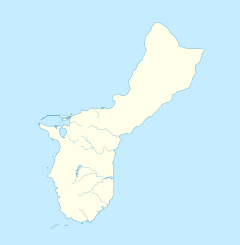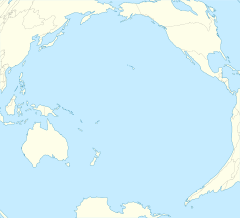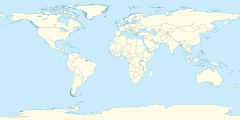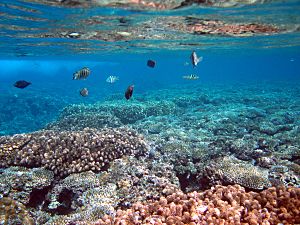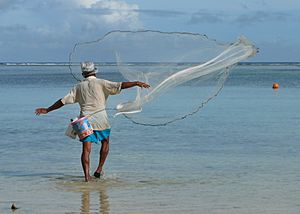Tumon Bay facts for kids
Quick facts for kids Tumon Bay Marine Preserve |
|
|---|---|

Tumon Bay from the north, 2000
|
|
| Location | Philippine Sea / Tumon, Guam |
| Nearest city | Tamuning, Guam |
| Area | 4.54 square kilometres (1,120 acres) |
| Established | 1999 |
| Governing body | Guam Department of Agriculture |
Tumon Bay is a beautiful bay in Guam, a territory of the United States. It opens up to the Philippine Sea. To the north, you'll find Two Lovers Point, and to the south, Ypao Point.
The entire bay is part of the Tumon Bay Marine Preserve. It's also called the Tumon Bay Marine Preserve Area (MPA) or Tumon Preserve. This is one of five special marine areas in Guam. The Preserve covers about 4.54 square kilometers (or 1.75 square miles). It stretches for roughly two miles.
A natural fringing reef separates the calm lagoon from the open ocean. This reef can be very wide, up to 1450 feet (440 meters) from the shore. Tumon Bay is located near the Tumon area, which is a popular spot for tourists. It's in the village of Tamuning. People love to visit the bay for fun activities and fishing.
Contents
Exploring Tumon Bay's Past
Tumon Bay might be where Ferdinand Magellan first landed on Guam on March 6, 1521. This was the first time Europeans met the islanders. Later, in 1672, the lives of Diego Luis de San Vitores and Pedro Calungsod ended near the bay during the Spanish-Chamorro Wars.
In the 1960s, the Government of Guam made a small opening in the reef. This allowed small boats to enter the bay. As more hotels were built in the 1970s and 1980s, some areas were dug deeper. This made it easier for people to swim at low tide near hotels and parks.
Protecting Marine Life
In 1986, experts noticed that fish numbers had dropped a lot. So, they started planning to protect parts of Guam's waters. In 1996, a law was passed to stop motorized boats from going inside the Tumon reef. Only jet skis could pass through a special cut to reach the open ocean. A dinner boat was also allowed to use this path.
In 1999, when the marine preserve was created, fishing boats were no longer allowed in the lagoon. Today, only small boats like kayaks or paddleboards can use the lagoon. In the 1990s, hotels also had the bay dredged. This was done to remove seaweed that often washed ashore.
Marine preserves like Tumon Bay began to be fully protected in 2001. Scientists started watching Tumon Bay closely in 2005. Tumon Bay Preserve makes up a big part of all protected marine areas in Guam.
Fishing Rules in the Preserve
In Tumon Bay Preserve, you can catch all kinds of fish using a hook and line. Some smaller fish, like young Goatfish and Jack, can be caught from the shore using a cast net. Rabbitfish and Convict Tang can also be caught with a cast net from the shore or reef.
Fishing from the bottom is allowed farther out from the shore. Trolling (fishing by dragging a line behind a boat) is allowed for fish that live in open water, but only outside the reef. Sometimes, people are still caught fishing illegally in Tumon Bay.
Scientists continue to study Tumon Bay to see how the marine life is doing. They found that different parts of the bay have different kinds of sea creatures. It will take many years for the seaweed and fish to fully recover. The coral reef in Tumon Bay also faces challenges from fresh water and algae blooms. This fresh water likely comes from hotel irrigation systems.
Fun Activities in Tumon Bay
Tumon Bay is a popular place for both fishing and fun activities. People enjoy swimming and using small boats without motors. The lagoon is great for snorkeling, whether you are a beginner or an expert.
Outrigger canoe teams practice and race on the bay. Matapang Beach and Tumon Bay even hosted outrigger canoeing at the 1999 South Pacific Games. If you like Scuba diving, the area off Gun Beach, at the north end of the bay, is often called "the best shore dive on Guam."
Images for kids
-
Map of benthic cover at Tumon Bay Marine Preserve, 2009
 | Roy Wilkins |
 | John Lewis |
 | Linda Carol Brown |


